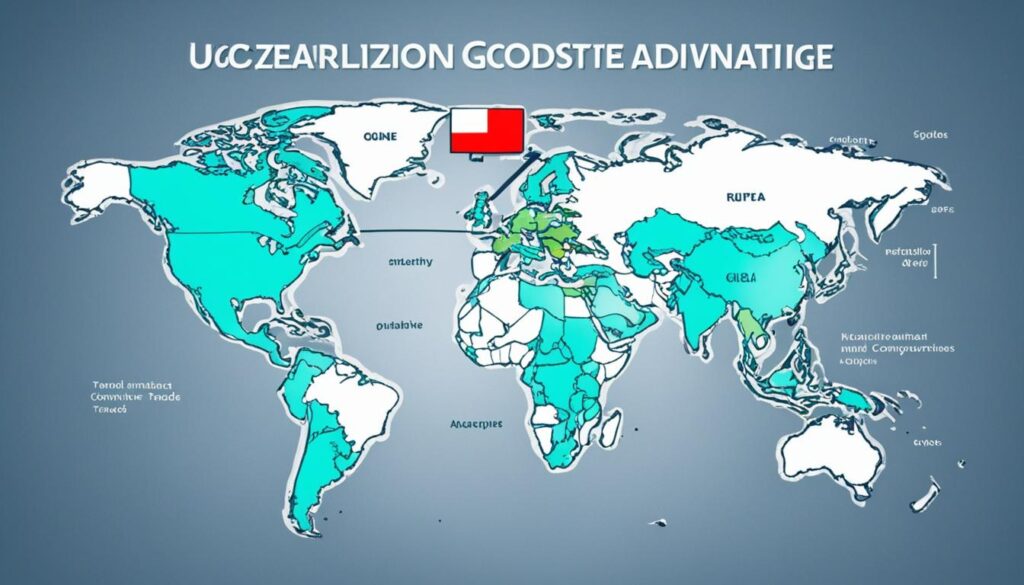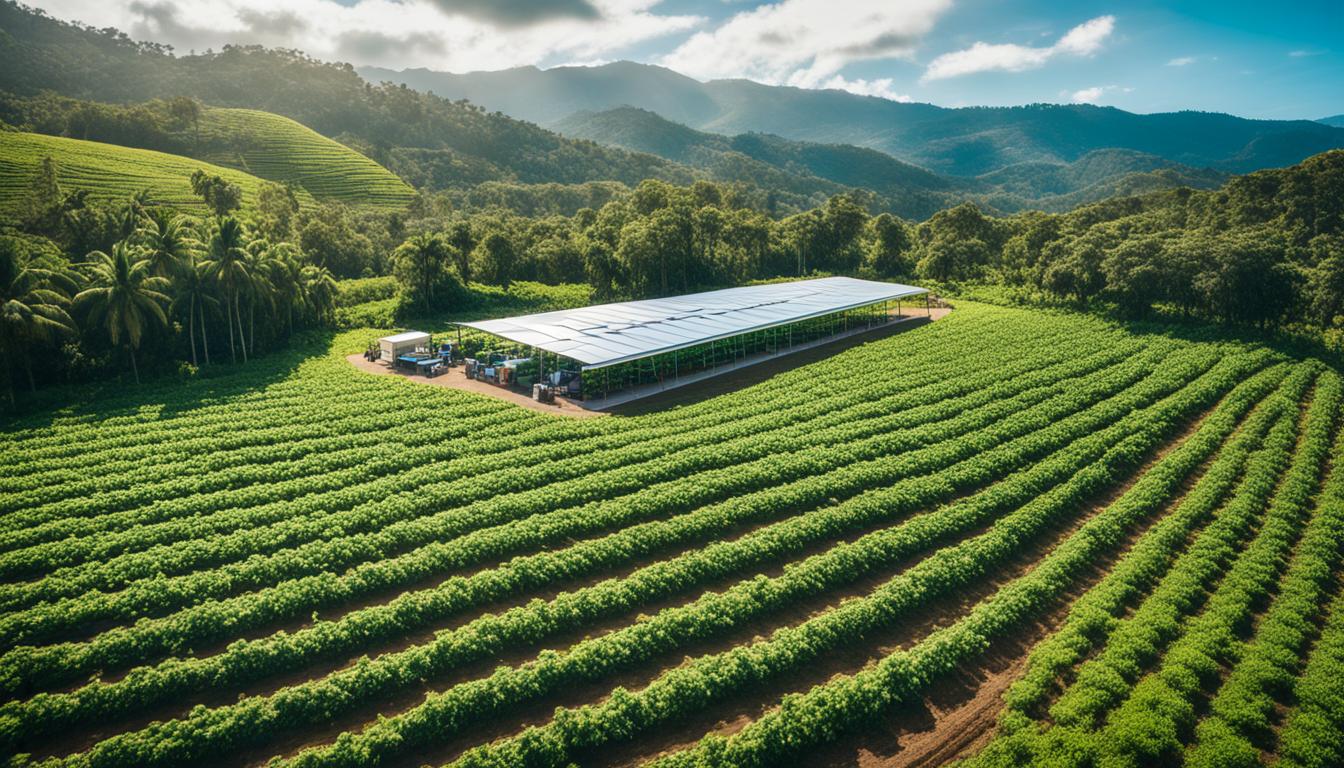Direct trade is a form of international trade that promotes ethical sourcing, fair trade practices, and a sustainable supply chain. It has a significant impact on the global economy, empowering producers and providing consumers with access to a wider variety of products.
Direct trade practices prioritize transparency in trading and social responsibility within the coffee industry. By establishing direct relationships between coffee producers and buyers, direct trade ensures that farmers receive fair compensation for their work and have the resources to invest in sustainable farming practices.
With direct trade, consumers can enjoy high-quality coffee while knowing that their purchase supports a fair and sustainable industry. By choosing direct trade options, individuals contribute to the well-being of coffee farmers and the preservation of natural resources.
Key Takeaways:
- Direct trade promotes ethical sourcing and fair trade practices.
- It empowers coffee producers and promotes a sustainable supply chain.
- Transparent trading relationships are established between producers and buyers.
- Direct trade ensures fair compensation for farmers and supports sustainable farming practices.
- By choosing direct trade options, consumers contribute to a fair and sustainable coffee industry.
The Importance of International Trade
International trade is a fundamental driver of economic growth and market expansion. It allows countries to access a wide range of goods and services that may not be available domestically or can be produced at a higher cost. Through international trade, consumers benefit from competitive pricing, leading to more affordable products.
Recognized by notable economists such as Adam Smith and David Ricardo, international trade fosters healthy competition among nations. This competition incentivizes businesses to offer competitive pricing, compelling them to constantly innovate and improve their products and services.
Moreover, international trade provides opportunities for market expansion. By tapping into international markets, businesses can increase their customer base and reach new demographics, leading to business growth and economic prosperity. Market expansion also enables businesses to achieve economies of scale, reducing costs and enhancing profitability.
“International trade fosters healthy competition, lowers prices, and expands markets.”
The Benefits of Competitive Pricing
One of the key advantages of international trade is the promotion of competitive pricing. When businesses face competition from international counterparts, they are compelled to offer products at more affordable prices to attract customers. This benefits consumers by providing them with a wider range of choices and lower prices.
Competitive pricing not only benefits consumers but also incentivizes businesses to innovate and improve their products. In order to stand out in the global market, companies must continuously invest in research and development, leading to technological advancements and improved products or services.
The Role of International Trade in Market Expansion
International trade plays a crucial role in expanding markets. By engaging in trade with foreign countries, businesses can tap into new customer segments and introduce their products to a global audience. This expands their market reach and potential customer base, resulting in increased sales and revenue.
Market expansion through international trade also allows businesses to diversify their revenue streams and reduce dependence on a single domestic market. By entering foreign markets, companies can mitigate risks associated with economic downturns or regulatory changes in their home countries. This diversification helps to ensure long-term sustainability and growth.
Furthermore, market expansion through international trade encourages businesses to adopt more efficient production methods to meet the demand of global customers. This drives productivity enhancements and fosters innovation, positioning businesses at the forefront of their respective industries.
Comparative Advantage and Specialization
Comparative advantage and specialization are fundamental concepts in international trade. They provide countries with the opportunity to optimize their production and achieve efficient outcomes. By capitalizing on their unique assets and resources, countries can produce goods more efficiently and at a lower cost, allowing them to specialize in the production of certain goods.
Specialization occurs when countries focus on producing goods in which they have a comparative advantage, meaning they can produce those goods at a lower opportunity cost compared to other countries. This leads to a more efficient allocation of resources and a higher overall productivity.
David Ricardo, a renowned economist, introduced the concept of comparative advantage to explain why countries can benefit from trade even if they have an absolute advantage in producing all goods compared to other countries. According to Ricardo’s theory, specialization and trade allow countries to expand their consumption possibilities beyond what they could produce on their own.
“It is the maxim of every prudent master of a family never to attempt to make at home what it will cost him more to make than to buy. […] What is prudence in the conduct of every private family can scarce be folly in that of a great kingdom.”
Comparative advantage and specialization enable countries to engage in trade and exchange goods they cannot efficiently produce for goods they need. This promotes interdependence and enhances welfare through access to a wider variety of goods at lower costs.
Let’s take a look at the table below to see a hypothetical example of how comparative advantage and specialization can lead to more efficient production:
| Country | Good A (Quantity Produced) | Good B (Quantity Produced) |
|---|---|---|
| Country A | 100 | 50 |
| Country B | 50 | 100 |
In this example, Country A has a comparative advantage in producing Good A because it can produce more of it compared to Country B. On the other hand, Country B has a comparative advantage in producing Good B. If both countries specialize in producing the goods they have a comparative advantage in and trade with each other, they can enjoy higher overall production levels and access to both goods at lower costs.
The concept of comparative advantage and specialization demonstrates how trade can benefit countries by promoting efficient production, expanding consumption possibilities, and fostering interdependence among nations. It is a fundamental principle of international trade that has significant implications for global economic development.

The Growth of International Trade
International trade has experienced significant growth over the last century. The integration of national economies into the global economic system, known as globalization, has led to a remarkable increase in trade between countries. The value of world exports has grown exponentially, with exports today being more than 40 times larger than in 1913. Trade has grown more than proportionately with GDP, indicating the positive impact of globalization on economic development. Global trade has become a fundamental part of economic activity worldwide.
One key driver of trade growth is the continuous expansion of the global economy. As countries undergo economic development and seek to diversify their industries, they often turn to international trade as a means for sustained growth. By engaging in trade, countries can access a wider market for their goods and services, promoting increased consumption and business expansion. This, in turn, stimulates economic development by creating jobs, generating income, and driving innovation.
Moreover, trade growth also allows countries to take advantage of their comparative advantages and specialization. Comparative advantage refers to a country’s ability to produce a particular good at a lower opportunity cost than another country. By specializing in the production of goods and services in which they have a comparative advantage, countries can optimize their resources and increase productivity. This leads to greater efficiency and competitiveness, driving trade growth and benefiting the global economy.
Trade Growth and Global Economic Interdependence
The growth of international trade has intertwined economies around the world, creating a web of interdependence. This interdependence has both benefits and challenges. On one hand, it fosters collaboration, cultural exchange, and the sharing of knowledge and technology. It enables countries to leverage their strengths and access resources and expertise from other nations. Additionally, trade growth has contributed to the reduction of poverty and improved living standards in many countries.
On the other hand, trade growth has also highlighted the vulnerability of economies to global shocks and disruptions. The interconnectedness of the global economy means that economic events in one country can have ripple effects across the world. For example, the recent COVID-19 pandemic demonstrated how disruptions to global supply chains and trade can significantly impact economies worldwide.
Overall, the growth of international trade has been a driving force behind economic development and the globalization of the world economy. As countries continue to engage in trade and leverage their comparative advantages, it is essential to ensure that trade practices are fair, inclusive, and sustainable. This requires the implementation of policies that promote transparency, protect workers’ rights, support environmental conservation, and address economic inequalities. By doing so, trade growth can continue to drive economic development while benefiting people and the planet.
| Year | World Exports (in USD billions) |
|---|---|
| 1990 | 3,440 |
| 2000 | 6,378 |
| 2010 | 15,345 |
| 2020 | 22,675 |
Key Findings:
- The value of world exports grew by around 6.6 times between 1990 and 2020.
- The average annual growth rate of world exports during this period is approximately 4.6%.
- The value of world exports has consistently increased over the years, indicating sustained trade growth.
Conclusion
Trade is a vital component of a country’s economy, with far-reaching effects on various economic indicators. The balance between imports and exports, reflected in trade surpluses and deficits, has a significant impact on economic growth and job creation.
When a country experiences a trade surplus, where exports exceed imports, it can bolster economic growth by generating revenue and creating employment opportunities. A trade surplus allows a country to capitalize on its competitive industries and expertise, enhancing its global market presence. This surplus can then be reinvested in domestic industries, further stimulating economic development.
Conversely, a trade deficit occurs when imports surpass exports, which may indicate a robust domestic demand but can also have adverse consequences. A persistent trade deficit can lead to a depreciation of the country’s exchange rate, making imports more expensive and potentially contributing to inflation. Therefore, maintaining a balance between imports and exports is crucial for sustaining a healthy economy.
It is essential for countries to implement policies that promote fair trade practices, transparency, and the equitable distribution of trade gains. This ensures that all participants in international trade benefit from globalization. Additionally, fostering ethical sourcing, sustainable supply chains, and responsible trading practices can minimize the negative environmental and social impacts often associated with global trade.
In conclusion, international trade has a profound economic impact, shaping a country’s GDP, exchange rate, inflation, and employment prospects. Achieving a trade surplus can foster economic growth, while managing trade deficits is necessary to maintain stability. Striking a balance and implementing fair trade policies are paramount for enabling sustainable economic development in an increasingly interconnected global economy.
FAQ
What is direct trade?
Direct trade is a form of international trade that promotes ethical sourcing, fair trade practices, and a sustainable supply chain in the coffee industry. It emphasizes transparency in trading and social responsibility, empowering producers and ensuring a more equitable trading relationship.
How does direct trade impact the coffee industry?
Direct trade practices in the coffee industry have a positive impact by supporting ethical sourcing, empowering producers, and promoting sustainable supply chains. It allows consumers to enjoy high-quality coffee while ensuring that the producers receive fair compensation for their work and are able to invest in their communities.
What are the benefits of direct trade?
Direct trade enables consumers to have access to a wider variety of coffee products, often at competitive pricing. It also promotes transparency in trading, empowering producers and ensuring that their labor rights are protected. By fostering fair trade practices and social responsibility, direct trade contributes to a more sustainable and ethical coffee industry.
How does direct trade differ from fair trade?
Direct trade and fair trade are similar in their goal of promoting ethical practices in the coffee industry. However, direct trade focuses on building direct relationships between producers and buyers, emphasizing transparency and empowering producers. Fair trade, on the other hand, is a broader certification system that sets standards for trade practices and ensures that producers receive fair prices and working conditions.
Does direct trade benefit only the producers?
Direct trade benefits both the producers and the consumers. By cutting out intermediaries, direct trade allows producers to earn a higher income and invest in their farms and communities. At the same time, consumers benefit from access to high-quality coffee and the knowledge that their purchase supports ethical and sustainable practices in the coffee industry.
How can I support direct trade?
To support direct trade, look for coffee brands that explicitly advertise their commitment to ethical sourcing, fair trade practices, and direct relationships with producers. Support companies that prioritize transparency and social responsibility in their supply chains.




